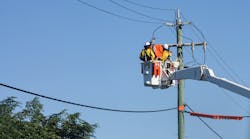To assure their continuing effectiveness and contribution, line workers must perform their work under the utmost safe conditions. They must follow best practice safety procedures every day to ensure they can go home safely at the end of each work day to their families.
Getting a Safe Start
Line workers must exercise self-awareness of their surroundings at all times. From the minute line workers leave home, or the lodging place, usually in the early morning, to report to their workout location, multiple hazards threaten their well-being. Traffic conditions can be challenging, especially in dark winter days.
To safely arrive on the work site, line workers must:
1. Wear a seatbelt upon starting the vehicle.
2. Refrain from any hand-held cell phone use while driving.
3. Obey and maintain posted speed limits.
Upon arrival at the workout location, line workers must follow all precautions in place to prevent infection and propagation of the COVID-19 virus. For example, each worker should wait for job instructions from the foreman while waiting in his or her vehicle to avoid unnecessary gathering. After the foreman informs each crew member of the assignment for the day, the workers can then gather all material and equipment necessary for the work day.
Performing a Truck Check
Wearing facial masks or clean face shields, the crew should perform a daily truck check to ascertain that all trucks, bucket trucks and any other truck required for the work are in good working condition. Any issues must be reported immediately to the foreman or general foreman for appropriate action.
Some of the items included on the daily checks are:
- Auto External Defibrillator (AED)—Keep it in good working condition with the battery pack and pads not expired. Make the unit accessible and have at least one unit available per crew. Train the crews on how to use the AED and on how to decide when to use it on an ailing person.
- First aid kits—Ensure all required contents are in each kit, with no expired antibiotic creams. Keep at least one kit accessible per truck.
- Daily Vehicle Inspection Report (DVIR)—The driver must fill out and date the Department of Transportation (DOT)-approved form every day.
- Water gel/burn blanket kit—At least one canister kit is to be available in each truck. The content is not to be expired, and the canister should be accessible.
- Chainsaw safety chaps—Carry the approved safety chaps, sized accordingly, in each truck for use by any worker operating the chainsaw, unless the worker is in the bucket.
- Personal protective equipment (PPE)---Closely examine, test and check out all rubber goods, rubber gloves, rubber protective sleeves, glove protectors, arc/fire protective clothing, etc., before each daily use. PPE is your last line of defense.
- Fire extinguisher—Mount at least one 5-lb. unit, rated ABC, in each truck. Require the driver to conduct monthly checks.
- Housekeeping---Keep the cab and the back of the truck clean and without litter at all times.
- Hoisting devices---Inspect, date and color-code these devices as required.
- Cargo securement—Secure all material in bins, containers or via cargo nests to prevent accidental drops on the road from loose material while driving the truck.
- Outrigger Pads—Store pads, in good condition, in designated spots and used to prevent imprints on the road surfaces for trucks equipped with outriggers.
- Grounding cables—Store appropriate grounding cables, size and length, in each truck for use as indicated.
- Work signage---Carry road signs required for proper traffic control and warning in each truck as required.
Each line worker performs an essential service, but is always exposed to real or potential hazards. Performing these daily safety checks minimize the potential for encountering later in the day unexpected circumstances.
Keep your eyes opened at all times. Do not take shortcuts. Follow instructions from your foreman. Follow safety rules. Protect yourself and your co-worker. Expect the unexpected.
Luis Ortega, CUSP, ([email protected]) worked for Northline Utilities LLC as a safety specialist. Prior to assuming his last role, he retired from Consolidated Edison Co. of New York after a 30-year career. Ortega holds a technical certificate from Power Technologies Inc. and earned a bachelor’s degree in civil engineering from The City College of New York.


